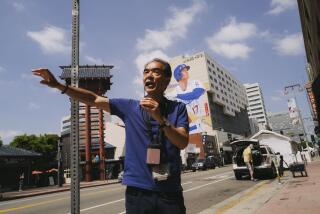Trying to tame Tokyo’s adult playground
- Share via
Reporting from Tokyo — Masatoshi Shimbo has always felt more than a bit paternal toward the changeling Roppongi district, the inner-city neighborhood where he grew up and his family made its real estate fortune.
But Roppongi often breaks his heart, over the decades turning from a U.S. servicemen’s haunt into a respectable business district and then back to disrepute -- the gentle women in kimonos giving way to mobsters and drug dealers.
Good or bad, in this famously safe city, Roppongi stands out: elegant one block, seedy the next, a multicultural meeting spot known as Tokyo’s most cosmopolitan dusk-to-dawn adult playground.
Through it all, Shimbo has fiercely gone to battle over Roppongi’s reputation. Now the 58-year-old merchants association leader is facing a new challenge: bar touts.
Popping up sometimes five or six to a block, the mostly young men from Nigeria and other African nations have a particularly un-Japanese way of doing business. In a country protective of its personal space, the hawkers sidle up to male foreigners, taking them in by the arm to suggest the charms of the scantily clad women waiting inside nearby hostess clubs.
Many take the bait of cheap drinks and casual sex -- and wind up with a headache the next morning. Patrons have had their drinks spiked, then woozily regained consciousness hours later with no memory of the previous evening or knowledge of the thousands of dollars charged to their credit cards.
In an unprecedented move, the U.S. Embassy in Tokyo last year warned the 40,000 American citizens here to avoid Roppongi and its nearly 350 bars and clubs. Without citing numbers, officials pointed to a “significant increase” in drink-spiking incidents.
“The U.S. Embassy continues to receive reliable reports of U.S. citizens being drugged in Roppongi-area bars,” the warning read. “Assaults on Americans have also been reported in connection with drink-spiking.”
The July bulletin, which followed warnings by the British and Australian embassies, sent Shimbo into action. Within days, members of the Roppongi Commerce Shop Owners Assn. met with U.S. officials and pledged steps to correct the problem.
“I wish I could have told them there isn’t such a practice in Roppongi,” said Shimbo, the group’s vice chair. “But in reality, these things do go on here.”
Roppongi’s name translates into “six trees,” from the samurai families who lived here during feudal times. After World War II, the area was a popular haunt for U.S. servicemen, and visiting military men still sometimes abound here.
When the economy was good, foreign-born stockbrokers and stock traders wandered out of their offices in the upscale Roppongi towers to spend their money here, attracting a parade of young, single Japanese women.
But Roppongi can also show a reckless, bad-boy side. In 2004, four foreign businessmen died after snorting cocaine that police said Roppongi dealers had mixed with heroin.
The area has also been the turf of yakuza. For years, the Inagawa-kai, a major crime syndicate, has been based in Roppongi. In 2007, there was a mob hit in broad daylight nearby.
For years, Roppongi has also attracted countless foreign women lured by the prospect of making big money talking to customers in the area’s numerous gentlemen clubs. Lucie Blackman of Britain, a former flight attendant who worked in a Roppongi hostess bar, disappeared in 2000 and the remains of her dismembered body were found in 2001.
“The irony of Roppongi is that the rest of Japan feels so safe and suddenly you’re in this unknown territory,” said Clare Campbell, whose 2009 book, “Tokyo Hostess,” detailed Blackman’s death. “You can’t assume that every place in Japan is safe, because it isn’t.”
The bar touts began appearing a decade ago. Slowly, their tactics have gotten more brazen, merchants say.
Shimbo’s group began a night patrol five years ago to pick up street trash and erase graffiti, but now the volunteers spend much of their time observing the touts, reporting violations such as aggressive solicitation.
Merchants have posted signs warning against harassment of passersby and last year police made 28 arrests -- double from the year before. But the touts won’t go away.
A tout who identified himself as Smithy, a Nigerian wearing a Scottish cap, denied that he harasses anyone. “I do not pull people into bars,” he said. “They go in on their own free will.”
Some visitors say that Tokyo police, in trying to bring order to the area, have harassed foreign bar patrons, searching them for drugs without proper cause, demanding urine samples.
“Nowadays, everyone is a mark in Roppongi,” said human rights activist Debito Arudou, who has written about police practices on his blog. “I don’t like being made a mark of.”
In an interview, a 31-year-old American said his drink was spiked in a Roppongi bar last year. He later learned of more than $10,000 in unauthorized charges to his credit card.
After going to a bar with two friends, the man’s group was approached by two women. The men bought a round of drinks. The victim said he woke up the next morning, in his own bed, with blood on his shirt, the evening wiped from his memory.
The man, who said he did not want to give his name out of embarrassment, believes that Tokyo police were less than responsive to the case. Authorities say there is too little evidence to act on.
“I always avoided the area with the aggressive touts -- we called it the gantlet,” said the man. “I never thought this would happen to me.”
Shimbo wants to guard against such troubles. So he and his volunteers say they will continue their nighttime patrols.
“I love this neighborhood,” he said. “I’m not giving up.”
More to Read
Sign up for Essential California
The most important California stories and recommendations in your inbox every morning.
You may occasionally receive promotional content from the Los Angeles Times.











